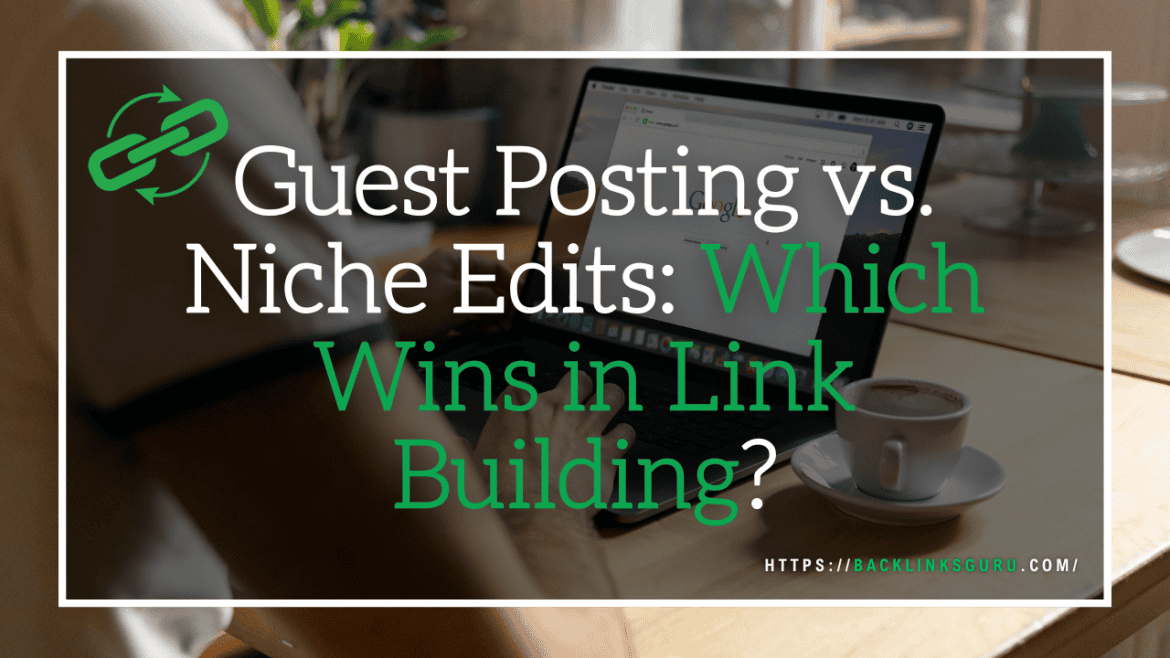Guest Posting Is Dead… Or Is It? The Truth About Niche Edits in 2025
In the ever-evolving landscape of Search Engine Optimization (SEO), effective link building remains a cornerstone for achieving higher search engine rankings and driving organic traffic. Two prominent link-building strategies, guest posting and niche edits, offer distinct approaches to acquiring high-quality links. This article will delve into a detailed comparison of guest posting vs niche edits, exploring their individual strengths, weaknesses, and suitability for various SEO strategies. We’ll explore when to leverage guest posting and niche edits to build curated links.

Understanding Link Building
What is Link Building?
Link building refers to the process of acquiring hyperlinks from other websites to your own. These hyperlinks, or links, act as votes of confidence from one website to another, signaling to search engines that the linked website is a credible and valuable resource. Effective link building, therefore, is crucial for improving a website’s authority, visibility, and ultimately, its search engine ranking. The quality and relevance of these links are paramount; links from authoritative and trustworthy sites within your niche carry significantly more weight than those from low-quality or irrelevant sources. Links to existing content should be treated with as much importance as links to new content.
Importance of Link Building in SEO
The importance of link building in SEO cannot be overstated. Search engines like Google use links as a key factor in determining a website’s authority and relevance. A strong backlink profile, composed of high-quality links from reputable websites, signals to the search engine that your website is a valuable resource worthy of higher rankings. This increased visibility translates to more organic traffic, leading to greater brand awareness, lead generation, and ultimately, higher conversions. Link building is thus one of the most important SEO strategies. Without a solid foundation of curated links, even the most well-optimized website may struggle to achieve its full potential in search engine results. If you want to make niche edits and gain high-quality links, you first need to understand the impact on SEO.
Key Link Building Strategies
Several link-building strategies exist, each with its own set of advantages and disadvantages. Guest posting involves creating new content and publishing it on another website in your niche with a link back to your own site. Another approach to get links is to make niche edits, which focuses on link insertion into existing content on relevant websites. Other strategies include broken link building, resource page link building, and skyscraper content. Understanding the nuances of each strategy and their potential impact on your SEO is crucial for developing a successful link-building strategy. In the following sections, we’ll examine these two primary link-building strategies, guest posting vs niche edits, to determine which one wins in different scenarios and to help you better understand publishing guest posts.

Guest Posting
What is a Guest Post?
A guest post, also known as a guest blog post or guest contribution, is an article or blog post written by an individual for publication on another website. Typically, the guest post will include a link back to the author’s own website, serving as a valuable link placement and a part of a comprehensive link-building strategy. The website accepting the guest post benefits from fresh, new content, while the author gains exposure to a new audience and a high-quality link. Guest blogging is a mutually beneficial arrangement, allowing for the exchange of valuable content and backlinks between websites in your niche. While not every website accepts guest posts, seeking out guest post opportunities can be a great way to build authority and drive traffic.
Benefits of Guest Posts
Guest posting remains one of the most effective and ethical link-building strategies in modern SEO. By contributing valuable content to relevant websites in your niche, you gain much more than just a backlink. Here’s how guest posts can benefit your website’s SEO and brand visibility:
1. High-Quality Backlinks for SEO Performance
Guest posts often provide dofollow backlinks from reputable and high-authority websites. These links signal trust to search engines like Google, which can improve your domain authority and organic rankings over time. Unlike low-quality or spammy backlinks, guest post links are usually editorially placed, making them safer and more valuable.
2. Increased Referral and Targeted Traffic
Publishing content on websites with an established audience means you’re reaching potential visitors who are already interested in your topic. A well-placed link within a quality guest post can drive consistent referral traffic to your site, especially when the content is evergreen or listed on high-traffic pages.
3. Builds Brand Authority and Trust
Contributing insightful content to authoritative websites helps position your brand as a thought leader in your industry. Readers see your name and website associated with credible sources, which increases trust and strengthens your brand presence—essential for long-term digital marketing success.
4. Expands Your Network and Reach
Guest posting allows you to build relationships with other site owners, editors, and influencers in your niche. These connections can lead to further collaborations, cross-promotions, or even more guest post opportunities, creating a compounding effect on your backlink strategy.
5. Supports Indexing and SEO Diversification
Backlinks from diverse domains help search engines discover and index your pages faster. Guest posts also contribute to a natural backlink profile, especially when you diversify anchor text, link placements, and linking domains.
6. Opportunity for Targeted Anchor Text Optimization
When writing your own guest posts or using a managed guest posting service, you can often control the anchor text used. This helps optimize for specific keywords while avoiding over-optimization, which is a common mistake in aggressive link-building.
Finding Guest Post Opportunities
Guest posting is one of the most effective strategies for building authority backlinks and improving SEO—when done right. The key lies in finding high-quality, relevant websites that accept guest contributions and align with your niche. Here’s how to identify the best opportunities:
1. Use Advanced Google Search Operators
Google remains one of the simplest and most effective tools to uncover guest posting prospects. Try search queries like:
"[your niche] write for us""[your topic] guest post guidelines""submit a guest post" + [your keyword]
These search strings help uncover pages specifically set up to attract guest contributors.
2. Explore Your Competitors’ Backlinks
By analyzing where your competitors have published guest posts, you can uncover high-quality opportunities. Use SEO tools like Ahrefs, SEMrush, or Ubersuggest to examine their backlink profiles. Look for backlinks coming from blog posts on domains that aren’t their own—these are often guest contributions.
3. Check Niche Communities and Directories
Many industries have online directories or communities that accept contributions or list blogs open to guest posts. Examples include:
- Blogging directories
- Content marketing forums
- Facebook or LinkedIn groups focused on guest blogging or digital PR
These platforms are ideal for discovering both well-known and hidden gems in your niche.
4. Use Guest Post Marketplaces
Several platforms connect publishers and contributors directly. While not all are free, they can streamline the process of getting published. Be selective, and focus on platforms that vet their blogs for quality and relevance.
5. Build Relationships First
Cold-pitching works, but building a relationship first increases your chances of success. Engage with the target blog’s content—leave thoughtful comments, share their posts on social media, and mention them in your own content before pitching. This builds familiarity and trust.
6. Look at Author Byline Trails
When you see a guest post in your niche, search the author’s name. Many professional writers and marketers contribute across multiple sites. Their author bylines can lead you to additional sites that accept guest posts in your industry.
Niche Edits
What is a Niche Edit?
A niche edit, sometimes referred to as a link insertion, is a link-building strategy that focuses on adding a link to your website within relevant, existing content on another website. Unlike guest posting where you create new content, niche edits involve identifying appropriate pages on websites in your niche and then contacting the site owner or editor to request the insertion of a link to your site within the existing text. The goal is to find a natural and contextually relevant placement for the link, making it appear as an organic part of the content. This approach can be an efficient way to acquire high-quality links, as it leverages the established authority and relevance of the existing page. Unlike guest posting, niche edits do not require creating entirely new content, which can save time and resources. Niche edits focus on securing links within existing content.
Niche Edit Link Insertion Process
The niche edit link insertion process typically begins with identifying websites in your niche that have relevant and high-quality existing content. The next step involves carefully reviewing the content to find a natural and appropriate place to add a link to your website. The link should enhance the reader’s experience and provide additional value. Once you’ve identified the target page and anchor text, you’ll need to reach out to the website owner or editor and make a request for the link insertion. This outreach should be personalized and explain why the link would be beneficial to their audience. If the website owner agrees, the link is added to the existing content, completing the niche edit process. The link placement should appear to be organic. Niche edits offer an alternative to guest posting.
Benefits of Niche Edits
Niche edits, also known as contextual link insertions, are a powerful and efficient link-building technique that involves adding backlinks to existing content on relevant, aged web pages. Unlike guest posts, which require new content creation, niche edits leverage the authority and indexing power of established content. Here are the key benefits of this method:
1. Faster Indexing and SEO Impact
Since the backlink is placed in already-indexed content, Google can crawl and recognize the link much faster than with new posts. This often leads to quicker improvements in keyword rankings and visibility.
2. Greater Trust and Authority
By inserting your backlink into content that has already earned trust, traffic, and authority, you’re benefiting from the SEO strength that page already holds. This can pass stronger link equity to your website, boosting your domain authority.
3. Contextual and Relevant Placement
Niche edits allow for highly contextual backlinks, meaning the link is surrounded by relevant content within a paragraph that naturally fits your topic. This is preferred by search engines and considered a more “organic” way to gain backlinks.
4. Cost-Effective Strategy
Since there’s no need to write or publish new content, niche edits can often be more budget-friendly than traditional guest posting. It saves time, reduces production costs, and still delivers strong SEO results.
5. Improves Link Diversity
Adding niche edits to your backlink profile enhances diversity, which is critical for a natural-looking SEO strategy. It signals to search engines that your site earns backlinks from various sources and types of content.
6. Ideal for Affiliate and Niche Sites
Niche edits are especially useful for affiliate marketers and niche website owners who need quick wins in search rankings. With the right placements, you can funnel more targeted traffic to money pages without waiting weeks for content to gain traction.

Comparing Guest Posting vs Niche Edits
Guest Posting vs Niche Edits: Key Differences
When it comes to building high-quality backlinks, two of the most effective strategies in SEO are guest posting and niche edits. While both can improve your site’s visibility, authority, and rankings, they work in different ways and suit different goals. Here’s a breakdown of how these two methods compare:
1. Content Creation
- Guest Posting: Involves writing brand-new, original content to be published on another website. You typically contribute a blog post and insert your backlink within the article.
- Niche Edits: Involves placing your backlink into existing content that’s already indexed and live on a site, without writing a full new article.
Key Difference: Guest posts require fresh content creation; niche edits leverage existing content.
2. Turnaround Time
- Guest Posting: Can take longer due to the content writing, approval process, and editorial calendar of the site.
- Niche Edits: Generally faster, since there’s no need to write new content—just identify suitable content and negotiate link placement.
Key Difference: Niche edits typically offer quicker results.
3. SEO Impact
- Guest Posting: Builds brand visibility and positions you as a thought leader. Google favors fresh content, so this can be a great long-term strategy.
- Niche Edits: Because the content is already indexed and aged, the backlink can pass authority faster, often leading to quicker ranking improvements.
Key Difference: Guest posts boost long-term credibility; niche edits deliver faster SEO gains.
4. Context and Relevance
- Guest Posting: Gives you full control over the context of the backlink. You can craft the surrounding content to perfectly suit your link.
- Niche Edits: Your link is placed within content that may not have been written with your site in mind. Still, smart edits can ensure contextual relevance.
Key Difference: Guest posts allow better control over content context.
5. Cost and Effort
- Guest Posting: May cost more due to content creation, editing, and outreach.
- Niche Edits: Often more budget-friendly because you’re skipping the writing process.
Key Difference: Niche edits can be more cost-effective and time-efficient.
6. Link Diversity
Both methods are valuable for building a natural backlink profile. A mix of guest posts and niche edits signals to search engines that your site earns links from a variety of sources.
Which One Should You Use?
- Choose guest posting if you’re looking to build authority, generate referral traffic, and establish yourself or your brand in your niche.
- Choose niche edits if you want quick wins in rankings, already have content marketing covered, or need faster indexing.
Pro Tip: Use both in your link-building strategy for the best of both worlds—brand authority and quick SEO traction.
Which is More Effective for Link Building?
Determining whether guest posting or niche edits are more effective for link building is not straightforward. It often depends on various factors, including your SEO goals, resources, and the specific niche you’re targeting. Guest posting can be highly effective for building brand awareness and establishing yourself as an authority in your niche, while also securing a valuable backlink. Guest posting involves creating new content and can be time-consuming. However, niche edits can be a quicker way to acquire high-quality links from established websites. This is because niche edits focus on link insertion within existing, authoritative content. Often, the decision comes down to time, resources, and the specific goals of your link building strategy. Niche edits vs guest can be a difficult decision.
Using Guest Posting and Niche Edits Together
The most effective link building strategy often involves a combination of guest posting and niche edits. Guest posting can be used to build relationships with other website owners and establish yourself as an authority in your niche, while simultaneously securing valuable backlinks. This is especially beneficial when you want to showcase your expertise and control the context surrounding your link. Niche edits can then supplement this by providing additional high-quality links from existing content on relevant websites. Combining these two strategies allows you to diversify your link profile, tap into different audiences, and achieve a more well-rounded SEO strategy. You may want to consider guest posting or niche edits.

Choosing the Right Strategy
Factors to Consider When Choosing Between Guest Posts and Niche Edits
When deciding between guest posting or niche edits, several factors should influence your decision. Your budget plays a crucial role; guest posting requires more time investment in content creation, while niche edits might involve paying for link insertion services. Your target audience is also important; consider which strategy will best reach your desired audience. The specific niche you’re in matters; some niches may be more receptive to guest posting, while others might be better suited for niche edits. Additionally, your SEO goals will determine the best approach; guest posting can be beneficial for brand awareness, while niche edits can provide quicker ranking boosts. Therefore, carefully consider these factors to determine which link building strategy aligns best with your resources and objectives. The decision of niche edits vs guest posting comes down to a variety of factors.
How to Get Niche Edits
Niche edits, also known as contextual backlinks or curated links, are placed within existing articles on established websites. These types of backlinks can pass authority quickly and help boost your SEO rankings when placed strategically. Here’s how to go about getting them:
1. Manual Outreach to Webmasters
Start by identifying relevant blogs or websites in your niche that already have content published. Use tools like Ahrefs, SEMrush, or Google search operators to find potential link targets. Once you’ve identified suitable posts, reach out to the site owner or editor and offer to add value to their existing content with a helpful resource—your link. Personalize your emails to improve your chances of a response.
2. Use Niche Edit Services
If manual outreach is too time-consuming, consider using a niche edit service. These services already have a database of websites open to contextual backlinks. For a fee, they’ll handle the placement, communication, and sometimes even ensure the anchor text matches your SEO strategy. Just make sure to use reputable providers who focus on quality, relevance, and ethical practices.
3. Find Aged Content with High Authority
Prioritize getting your links placed in aged, authoritative posts that already rank or get traffic. These kinds of niche edits tend to index faster and pass more link equity. Check the URL’s backlink profile, domain authority, and indexing status before committing.
4. Offer Value in Return
Whether you’re doing outreach directly or through a service, always lead with value. You might offer to update a blog post, suggest a useful resource, or even propose fixing broken links in exchange for a placement. The more helpful you are, the more likely webmasters are to collaborate.
5. Monitor Your Links
Once your niche edit is live, use tools like Google Search Console or backlink checkers to ensure the link is indexed and hasn’t been removed. Keep a spreadsheet or report of your placements for SEO tracking and future disavow needs if necessary.
Conclusion: The Best Link Building Strategy for Your Needs
In conclusion, there’s no universal “winner” in the guest posting vs niche edits debate. Both guest posting and niche edits offer unique advantages and can be valuable components of a comprehensive link building strategy. Guest posting excels at building brand awareness and establishing authority, while niche edits provide a more efficient way to acquire high-quality links from existing content. Ultimately, the best approach depends on your specific goals, resources, and the characteristics of your niche. A well-rounded SEO strategy often incorporates both guest posting and niche edits to achieve optimal results. You want to make sure you are aware of the best strategy for SEO strategies. Niche edits offer various benefits, while guest posting involves other benefits. You want to consider all the benefits of guest posting and niche edits.

Frequently Asked Questions
What are the differences between guest posting and niche edits?
Guest posting involves creating and publishing content on another website within your industry or niche, often with the goal of securing backlinks and reaching a new audience. Niche edits, on the other hand, focus on inserting backlinks into existing content on reputable websites. Both methods are effective for link building, but they serve different purposes and can yield different results.
Which builds better links: guest posting vs niche edits?
The effectiveness of guest posting vs niche edits largely depends on your specific goals. Guest posts can provide high-quality backlinks and enhance your brand visibility, while niche edits often provide quicker results by leveraging existing content. Ultimately, the best choice depends on your link building strategy and the resources available.
What are the benefits of guest posts?
Guest posts offer several benefits, including increased exposure to new audiences, high-quality backlinks, and enhanced credibility within your niche. By publishing on reputable websites, you can establish authority in your industry and drive targeted traffic to your own site, making it a valuable link building strategy.
How can I find guest post opportunities?
To find guest post opportunities, consider researching websites within your niche that accept guest contributions. Utilize search queries like “write for us” combined with your niche keywords, and explore social media platforms and communities dedicated to guest blogging. Networking with other bloggers can also lead to valuable guest post opportunities.
Are niche edits better than guest posts for SEO?
Niche edits can be considered better for SEO in specific scenarios, especially when seeking quick backlinks. Niche edits involve inserting links into already established content, which can provide immediate benefits without the need for content creation. However, guest posts typically offer more comprehensive brand exposure and engagement opportunities.
Can I use guest posting and niche edits together?
Yes, using guest posting and niche edits together can enhance your overall link building strategy. Combining both methods allows you to secure high-quality backlinks through guest posts while also benefiting from the quick results offered by niche edits. This diversified approach can maximize your outreach and SEO efforts.
What are the characteristics of high-quality guest posts?
High-quality guest posts typically feature valuable, well-researched content that is relevant to the target audience. They should offer unique insights, be free of grammatical errors, and include proper formatting. Additionally, securing placements on reputable websites in your niche enhances the quality and effectiveness of the backlinks obtained through guest posting.
How do niche edits work?
Niche edits work by inserting backlinks into pre-existing articles on established websites. This method allows for immediate link acquisition without the need for creating new content. Niche edits can be an efficient way to gain backlinks, especially when targeting reputable sites within your industry or niche.
Are niche edit opportunities easy to secure?
Securing niche edit opportunities can vary in difficulty based on the website’s policies and the quality of your request. Building relationships with site owners and offering valuable content suggestions can increase your chances of successfully securing niche edit links. Additionally, focusing on reputable websites in your niche can yield better results.



